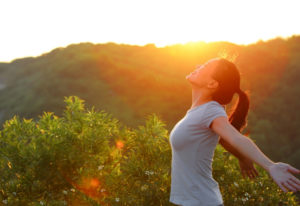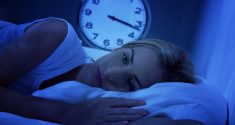Keeping a healthy sleep-wake cycle is essential to our well-being. However, it can be difficult to figure out exactly what this means for your own circadian rhythm. We all know that getting eight hours of sleep is ideal, but there is less-common knowledge about ideal bedtimes and other important details. New research on the best time to go to sleep offers advice for people who want to make the lifestyle changes they need for optimal health.
Sleep: The Ultimate Lifestyle Hack
 Keeping a healthy lifestyle is the best strategy in both lifelong health and in feeling your best every day. While there is a great deal of emphasis placed on healthy eating and sleep habits, we place less importance on sleep. This comes at a huge detriment to public health. As countless studies show, keeping a healthy circadian rhythm can have just as great an impact on your well-being as any other lifestyle factor.
Keeping a healthy lifestyle is the best strategy in both lifelong health and in feeling your best every day. While there is a great deal of emphasis placed on healthy eating and sleep habits, we place less importance on sleep. This comes at a huge detriment to public health. As countless studies show, keeping a healthy circadian rhythm can have just as great an impact on your well-being as any other lifestyle factor.
Despite the importance of keeping a steady circadian rhythm, modern life can be a challenge. We live in a world with unprecedented 24-hour demands. When we can finally close our computers after a long workday, we have smartphones and other devices offering social opportunities.
Our environment, including our bedrooms, is bathed with light pollution that can make it difficult to sleep. Although these factors can create hurdles in maintaining a healthy lifestyle, it is more important than ever to keep our internal clocks on track.
Exactly when should you go to sleep and wake up? The exact answer depends on several factors, including your natural sleep-wake rhythm. Although every person has a unique internal clock, most of us fall into “chronotypes” that describe our natural rhythms.
Chronotypes and Your Internal Clock
Although each of us has a unique cycle, most of us fall into one of two basic types. Traditionally, research breaks it down into the categories of morning lark and night owl, representing people who naturally go to sleep and wake early from those who prefer a later bedtime schedule and naturally awaken later.
Several studies have found that people who have natural rhythms that are not in alignment with the outside world are at greater risk for a variety of diseases and other health issues. Night owls are at higher risk of a variety of chronic illnesses and are ten percent more likely to die early compared to morning larks. This is due to the fact that the inherent conflict between their natural sleep-wake cycle and the schedule of the outside world creates a state of perpetual jet lag for this chronotype.
Although this two-chronotype framework is easy to understand, it may be oversimplifying a more complicated issue. Some modern sleep researchers now divide chronotypes into four main groups, including:
- The Bear chronotype, made up of by people who fall asleep and awaken according to the movement of the sun. These people are less prone to sleep disorders because they naturally keep a schedule that is aligned with our environment.
- The Wolf chronotype, in which people naturally wake around noon and are most active and productive late in the evening.
- Lion chronotypes that naturally wake very early and go to bed early as well.
- The Dolphin chronotype, which includes people who are very sensitive to their environment and likely to miss a great deal of sleep due to light, noise and other factors. These people are most productive around mid-day.
The Final Word on the Best Time to Go to Sleep

In addition, waking earlier appears to be important for your mood and productivity. People who go to sleep and awaken earlier are at lower risk of depression and other mood disorders. In fact, studies suggest that getting up earlier appears to be effective in improving a person’s mood — even if you are a night owl or other late chronotype.
Ultimately, studies show that we are healthiest when we go to sleep between 8 p.m. and midnight, waking roughly seven to nine hours later. Even more importantly, it is crucial to keep a stable schedule, going to sleep and waking at roughly the same time every day, even on the weekend. While the best times to go to sleep will vary with your natural circadian rhythm and the demands of your daily life, the early bird really does get the worm regardless of your chronotype.







